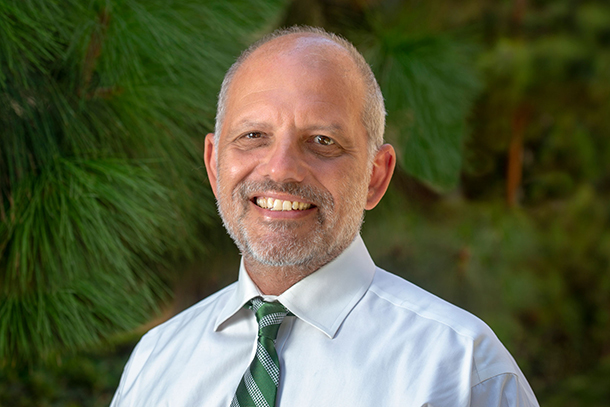Since joining USC Student Health as executive director and division chief for counseling and mental health last fall, Robert Mendola, MD, has worked to expand students’ access to mental health services on the University Park and Health Sciences campuses.
Mendola, a board certified adult psychiatrist and clinical professor of psychiatry and the behavioral sciences (practitioner) at the Keck School of Medicine at USC, brings more than two decades of experience directing psychiatric services at Cornell University’s student counseling center.
Under Mendola’s leadership, USC Student Health will have added 10 more mental health providers to its staff by December, substantially increasing its capacity to provide counseling directly to the students who seek it. The additional staff will allow Counseling and Mental Health to provide longer care to more students, Mendola said.
“Previously, with one counselor to every 1,800 students, we used our resources to provide an initial brief assessment to any student who contacted us in order to respond quickly, assess crisis and risk, and then triage that to either get in quickly or wait,” Mendola said. “We were referring 70 percent because we didn’t have the resources to treat the routine cases.”
While that approach made the best use of available resources at the time, Mendola said, “We also knew it was unrealistic to ask a freshman to take a bus to Santa Monica for counseling.”
His goal is to provide short-term care for nearly every student seeking mental health services on campus. He also hopes to develop long-term outpatient treatment through the psychiatry department at Keck Medicine of USC, he said.
Mendola aims to continue the trajectory and eventually refer only 20 to 30 percent of students to off-campus care.
Mental health care: It’s a job he loves
Raised in upstate New York just a block from a state psychiatric center, Mendola and his family regularly interacted with mentally ill patients with compassion and without fear. He was studying religion as an undergraduate when a professor suggested he consider pursuing psychiatry.
“I couldn’t believe that I could sit with someone for an hour, try to understand them, connect with them and make them feel understood, and they would pay me for that,” he said. “This is not a job; it’s what I loved doing.”
Mendola went on to receive his MD from State University of New York at Buffalo and complete his residency at the University of Massachusetts. His interest in student mental health developed in 1994 when he was recruited as a staff psychiatrist for Cornell.
“In contrast to my previous work with patients with chronic mental illness, I was struck by the motivation, insight and diversity of the student population,” he said. “And their capacity for making rapid improvements was refreshing.”
A bridge between outreach and prevention
Mendola was approaching retirement at Cornell when he discovered he could provide real value to Counseling and Mental Health at USC Student Health, from applying his experience with service models to acting as a bridge between outreach and prevention and clinical staff and services.
The most inspiring aspect of his job, he said, continues to be the students. They come with a wide range of perspectives and are at a critical age in developing their identities, while managing their relationships and academic work.
“This is a time of instability, and because the identity is so fragile at this age, it is commonly reflected in anxiety, panic, worry – ‘am I good enough?’ And in depression – ‘I am not good enough,’” Mendola said.
According to the American College Health Association’s 2017 National College Health Assessment, nearly one in five U.S. college students is affected with anxiety or depression.
Mendola’s message to students: “This is part of development, and if you feel these things, you are not alone.”
He added, “If you rely on social media, you’ll have the impression that everyone is OK except for you. I encourage you to have actual relationships and in-person communication.”
The community as client
While at Cornell, Mendola and his team used the JED Campus Program, a public health model for campus mental health, substance abuse and suicide prevention, to guide their efforts in these areas. Now he is part of the team implementing the nationally recognized model at USC.
“JED involves looking at the whole campus community as the client,” Mendola said. “For example, we can provide pockets of treatment with an open-door approach in nontraditional settings for students who would not usually reach out to us.”
USC is launching an evidence-based program called “Let’s Talk” on both campuses this fall. The program places counselors all across campus for students to drop in informally between classes.
USC Student Health plans to embed a therapist/behavioral health consultant with a primary care doctor to give immediate consultation to students who are less likely to seek out mental health care. Studies have shown that many students, including international students, students of color and male students are more likely to access mental health services when provided in a medical clinic.
Expanded access to mental health services is just one tenet in the multi-pronged JED Campus strategy. Two other principles include identifying students who are at risk and developing students’ life skills, and programs addressing these are already taking root this fall.
Resident assistants are taking intensive bystander training to identify and intervene when a resident is struggling. And a pilot seminar for 500 first-year students will focus on building the coping strategies and resilience skills students will need as they embark on their college careers.
The newly named Office for Health Promotion Strategy in USC Student Health will provide the infrastructure or “backbone” for the JED model at UPC and HSC. Mendola said Trojans can expect new initiatives and ongoing improvements around mental health as JED is implemented in the coming months and years.
— Andrea Bennett


